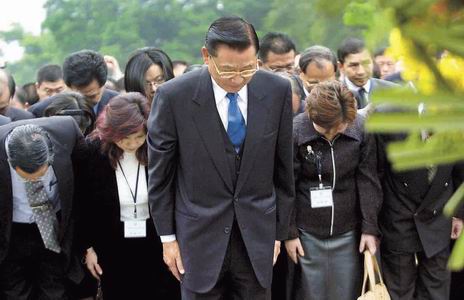
Taiwan¡¯s Kuomintang Vice Chairman Chiang Pin-kung bows
in front of the Huanghuagang 72 Martyrs¡¯Mausoleum in Guangzhou yesterday. It is
the KMT¡¯s first formal visit to the mainland since the group fled to Taiwan in
1949.(Photo: Xinhua)
Chiang Pin-Kun, vice-chairman of the Taiwan-based Chinese Kuomintang party
(KMT), visited the Guangzhou Huanghuagang Martyr Cemetery Tuesday morning.
Chiang Pin-Kun and his delegation arrived in Guangzhou Monday afternoon,
marking the KMT's first formal visit to the mainland since the group fled to
Taiwan in 1949.
When Dr Sun Yat-sen, founder of the KMT, led the Huanghuagang Uprising in
Guangzhou to overthrow the rule of the late corrupt Qing Dynasty (1644-1911)
government in April of 1911, 86 of his allies were slain.
A commemorative park was later constructed to mark the graves of 72 of the
heroes in Huanghuagang in Guangzhou's Dongshan District.
The park became known as the 72 Huanghuagang Martyr Cemetery and 94 years on,
has become a new tourist attraction in the Guangdong provincial capital.
The traditional Chinese Qingming Festival period is a busy period when people
from home and abroad come to pay their respects. The event usually takes place
on April 5, the traditional time that Chinese visit their ancestors final
resting place to worship during what is commonly known as the "grave sweeping"
festival.
Built in 1912, the park covers an area of more than 129,000 square metres. On
the main gate of the park are four Chinese characters "Hao Qi Chang Cun," which
means imperishable noble spirit.
The Chinese characters were written Dr Sun, the pioneer of the Chinese
revolution and the founding father of the republic. Sun died aged in 1925 at the
age of 59.
Buried at the cemetery are famous revolutionary martyrs Pan Dawei, Deng
Zhongyuan, Yang Xianyi, Feng Ru and Shi Jianru.
In 1986, the park was listed by the State Council as a key State-level
historical protection unit.
Chiang is hoping his visit to the mainland will ease recently strained
cross-Strait tensions as well as promote economic ties.
Chiang said he was particularly hoping to help farmers in Taiwan sell more
agricultural produce to the vast mainland market.
Currently, Taiwan's annual agricultural sales to the mainland are around
US$300 million while its agricultural imports from other provinces,
municipalities and regions come to US$500 million.
Spurred by the successful direct charter flight service during the lunar new
year period, Chiang said he would be discussing the possibility of providing
more charter flight services across the Straits during traditional festivals and
even at weekends to meet growing demand from both sides.
Chiang said he hoped to negotiate with relevant mainland departments about
opening direct cargo transport links cross the Taiwan Straits, benefiting
Taiwan's investors who have set up manufacturing facilities on the mainland.
Taiwan's investors "can waste no time to put their products into markets,"
Chiang said.
In remarks made Monday to Guangdong Governor Huang Huahua, Chiang hinted that
Lien Chan, chairman of the KMT, also wants to visit the mainland later this year
to discuss the possible expansion of economic ties between the mainland and
Taiwan.
Before leaving Guangzhou for Nanjing, capital of East China's Jiangsu
Province, Chiang met local representatives of Taiwan investors, to discuss ways
of smoothing business across the straits.



